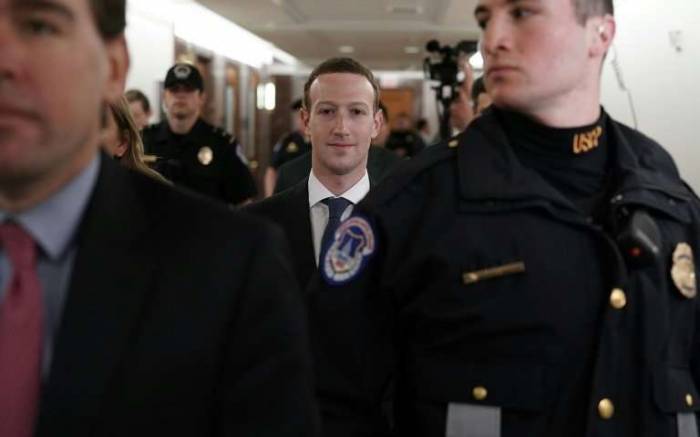Mr. Zuckerberg, clad in a navy suit and bright blue tie, entered the Senate room with an entourage of Facebook staffers and shook hands with Senator Bill Nelson, a Florida Democrat, before taking a seat. As lawmakers began their opening remarks, Mr. Zuckerberg sat stone-faced as Republicans including Senator John Thune of South Dakota talked about the need for Facebook to avoid creating “a privacy nightmare.”
Mr. Zuckerberg will face two days of congressional hearings, where he is expected to be grilled about how and why the company failed to protect its users private data.
This is Mr. Zuckerberg’s first appearance before Congress and his performance will be critical to the company’s future. His responses about the company’s ability to protect its users will be closely scrutinized by lawmakers and regulators as well as competitors, Facebook employees and the billions of people who use the platform across the globe.
The hearings were prompted by the revelation that Cambridge Analytica, a British political consulting firm linked to the Trump campaign, harvested data of an estimated 87 million Facebook users to psychologically profile voters. On Tuesday, the company announced it would begin offering a “data abuse bounty” program to reward people who report incidents of similar abuse.
But the hearings will expand far beyond the Cambridge matter. Senate and House lawmakers will take the opportunity to grill Mr. Zuckerberg, the 33-year-old iconic Silicon Valley entrepreneur, on the proliferation of so-called fake news on Facebook and on Russian interference on the platform during the 2016 presidential election.
The joint Senate Judiciary and Commerce Committees is holding its hearing first and Mr. Zuckerberg will appear before the House Energy and Commerce Committee at 10 a.m. Wednesday.
Regulation Ahead?
Mr. Thune, the chairman of the Senate Commerce Committee, called Facebook and its role in society “extraordinary” and began the hearing by explaining why Facebook is being singled out and why Mr. Zuckerberg was asked to appear alone.
He said the Cambridge Analytica situation underscored how Facebook can be used for nefarious reasons, saying it appeared “to be the result of people exploiting the tools you created to manipulate users’ information.”
In an indication that he may support legislation for internet companies, Mr. Thune said, “In the past, many of my colleagues on both sides of the aisle have been willing to defer to tech companies’ efforts to regulate themselves. But this may be changing.”
Iowa Senator Charles E. Grassley, who chairs the Judiciary Committee, said the tech industry “has a responsibility” to protect its users and said “the status quo no longer works.”
By the Numbers
There are a lot of numbers flying around in the hearing. So, to be clear: The figure of 87 million affected Facebook users comes from Facebook itself, and refers to the number of people the company calculated could have been affected, not the number who were.
Alexandr Kogan, the academic who Cambridge Analytica hired to harvest the Facebook data, has said that he collected information from the profiles of more than 50 million people. That figure is backed up by documents that have been reviewed by The New York Times, and other former employees of Cambridge Analytica.
Zuckerberg Welcomed by Dozens of Zuckerbergs on the Hill
This morning, many people woke up to a Facebook notification that their personal information had been collected by “This Is Your Digital Life,” a quiz app developed by a University of Cambridge researcher, which harvested the data that was ultimately passed to Cambridge Analytica. According to the notification, the app collected data including users’ public profile information, page likes, birthdays, and current cities.
But Facebook’s notifications also alerted people that their messages were possibly accessed during the breach. Aleksandr Kogan, a Russian-American academic who contracted with Cambridge Analytica’s British affiliate to harvest and provide private Facebook data, told The New York Times that the app harvested messages from the people who took part in the quiz directly, but not their extended friend network. Mr. Kogan added that the messages were not transferred to Cambridge Analytica.
Mr. Kogan said that the private messages were harvested as part of research that was conducted at Cambridge University in 2013 and the first half of 2014, before he began working with Cambridge Analytica.
The messages were collected for research into how people use emojis to convey emotions. They were kept securely in his university lab, known as the Cambridge Pro-Sociality and Well Being Lab, and access was restricted to a small group of people, Mr. Kogan said.
The message data “was obviously sensitive so we tried to be careful about who could access it,” Mr. Kogan said.
He stressed that his Facebook app only harvested messages from a “couple thousand” people who completed his questionnaire, not from their friends, he said.
During Mr. Kogan’s later work for Cambridge Analytica, his Facebook app would harvest data from people who took his questionnaire and from all their friends. But the data did not include private messages — it included only names, birth dates, locations and pages the users had liked, he said.
A Hot-Ticket Hearing
People lined up outside the hearing room on Tuesday. Tom Brenner/The New York Times
Several hours before Mr. Zuckerberg is scheduled to begin testifying, the line of people trying to get into the hearing room already stretched far down the hallway.
Annamarie Rienzi, a student at American University, was one of the first people in line. Wearing a T-shirt that read “#deletefacebook,” Ms. Rienzi said that she had come to the hearing to express her displeasure with the social network. She hadn’t actually deleted her Facebook account yet, she said, but was waiting to see how Mr. Zuckerberg performed before deciding whether or not to continue using the service.
“It’s really going to rest on this hearing,” she said. “It’s going to come down to if he’s honest, and if he learned from hiding so much information in the past.”
New York Times
More about: Facebook

























-1731503623.jpg&h=190&w=280&zc=1&q=100)






















